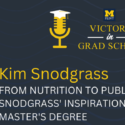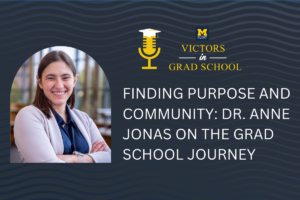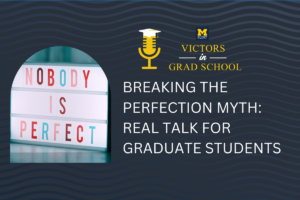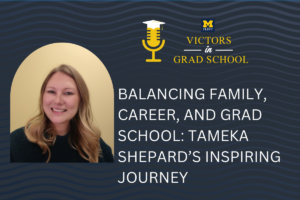In the latest episode of Victors in Grad School podcast, Dr. Christopher Lewis introduces us to Kim Snodgrass, a current Master of Public Health student at the University of Michigan-Flint. Kim’s story is an inspiring testament to perseverance, resilience, and the unyielding spirit to succeed, even after two decades away from the academic world. This blog post delves into her journey, highlighting the challenges she faced, the support systems that guided her, and the lessons she offers to others aspiring to excel in graduate school.
The Decision to Return: A Leap of Faith
Kim Snodgrass’s academic journey began over 20 years ago at Marygrove College, where she earned a Bachelor’s of Science in Human Nutrition and Foods. Following the sage advice to gain work experience first, Kim spent two decades serving her community through various public health roles, notably within women and infant health programs. It was this hands-on experience that reignited her passion for public health and solidified her decision to pursue a Master of Public Health (MPH) degree.
Choosing the Right Program: Why Public Health and Why U of M Flint?
When Kim decided to return to school, the choice of a Master of Public Health was clear. Her work underscored the importance of addressing social determinants of health—factors like socio-economic status, education, and environment that significantly impact health outcomes. This alignment with her professional experience and aspiration to serve underprivileged communities made the MPH program a natural fit.
For Kim, the University of Michigan Flint stood out for its welcoming community and supportive environment. Unlike larger, impersonal institutions, U of M Flint offered a family-like atmosphere reminiscent of her undergraduate experience at Marygrove College. This sense of community and belonging played a crucial role in her academic success.
Overcoming Obstacles: Embracing Challenges in Graduate School
Returning to graduate school after a long hiatus posed significant challenges, from mastering new technologies to navigating different academic requirements. Kim’s primary mode of learning in her undergraduate years had been in-person, but now she had to adapt to online learning platforms like Canvas. The transition was daunting, but U of M Flint’s IT support staff played a pivotal role, patiently guiding her through each step.
The challenges did not stop there. Courses like biostatistics proved particularly tough, but with proactive communication and seeking help, Kim turned potential roadblocks into building blocks. She reached out to her professors, took advantage of tutoring services, and relentlessly pursued academic excellence.
Building a Support Network: The Mentor Collective
One of the invaluable resources that Kim credited for her success was the Mentor Collective at U of M Flint. Initially, she was mentored by someone who helped her navigate the intricacies of her program. This mentorship was so impactful that Kim eventually became a mentor herself, guiding others through similar struggles. This support network provided not only academic assistance but also emotional and motivational support.
Practical Applications: From Classroom to Community
The knowledge and skills Kim gained in her MPH program have had a direct impact on her professional life. Working as a dietitian in Detroit, she applies her understanding of social determinants of health to better serve her clients. Questions on her nutrition assessments now include social factors, enabling her to make more informed referrals and provide comprehensive care.
Tips for Future Graduate Students: Setting Up for Success
Reflecting on her journey, Kim offers several tips for prospective graduate students:
- Research Programs Thoroughly: Understand what each program offers and ensure it aligns with your passions and career goals.
- Engage with Campus Life: Participate in fairs and events to build connections and immerse yourself in the community.
- Build a Supportive Network: Surround yourself with peers who uplift you. Engage with mentors and professors proactively.
- Utilize Campus Resources**: Take advantage of tutoring centers, writing centers, IT support, and other services offered by the institution.
- Stay Passionate: When challenges arise, remember why you chose this path and let that passion drive you forward.
Kim Snodgrass’s journey through graduate school is a compelling narrative of resilience, support, and relentless pursuit of knowledge. Her story underscores the importance of a supportive academic environment and the power of community in overcoming obstacles. Aspiring graduate students can draw valuable lessons from her experience, using her strategies to pave their own paths to success. As Kim continues her journey, aiming even higher with aspirations for a doctorate, her story remains a beacon of inspiration for all those embarking on their academic adventures.
TRANSCRIPT
Dr. Christopher Lewis [00:00:01]:
Welcome to the victors in grad school, where we have conversations with students, alumni, and experts about what it takes to find success in graduate school.
Dr. Christopher Lewis [00:00:11]:
Welcome back to Victor’s in Grad School. I’m your host, doctor Christopher Lewis, director of graduate programs at the University of Michigan Flint. Really excited to have you back again this week. And as always, I know that you’re on a journey. You are on a journey to either get into graduate school, get through graduate school, get out of graduate school. There’s lots of places that someone may be as you’re listening to this. And I love being able to talk to you every week to learn a little bit more about the journey that you’re on, but also to help you and to offer some resources, some advice, some things that may be able to make that journey a little bit smoother. Every week, I love being able to bring you different people, different people that have gone to graduate school, that are in graduate school now, but are working their way through or have gotten out of graduate school that are sharing their experiences with you.
Dr. Christopher Lewis [00:01:10]:
Because it’s important. It’s important to be able to listen, to learn, and to be open to seeing ways in which others have gone along that path, have found success in that path, may have struggled in that path, but they’ve picked themselves up and found that success in the end. That’s why every week I do bring you different guests, different people with different experiences that can share that with you. And they come from all walks of life. They come from all types of educational programs. But no matter what program that they’re on, they all had to do something or many things to be able to find the success that they wanted in their graduate school journey. And that’s what I’m trying to make sure that you can take out of every episode. And that’s why every episode brings you different people.
Dr. Christopher Lewis [00:02:08]:
So this week, I am really excited to be able to bring you a brand new guest. Kim Snodgrass is with us today, and Kim is a current master of public health student at the University of Michigan, Flint, and she did her undergraduate work at Marygrove College and along the way ended up in the master’s of public health program. So we’re gonna be talking about that journey, learning a little more about her, and I’m really excited to have her here. Kim, thanks so much for being here today.
Kim Snodgrass [00:02:36]:
Thank you for having me, doctor Lewis. It’s such an honor and privilege to be here with you on this podcast.
Dr. Christopher Lewis [00:02:42]:
Well, it is my pleasure having you here today. Really excited to be able to talk with you today and learn a little bit more. And one of the things that I love to do first is to turn the clock back in time. I wanna go back to those undergraduate years. You did your undergraduate years back at Marygrove College. And at some point, it might have been during undergrad. Maybe not. May have been after a few years of working.
Dr. Christopher Lewis [00:03:05]:
You made a choice. You made a choice to go to graduate school. Talk to me about that progression, that journey, and what led you to decide that going and getting that master’s of public health was the right choice for you?
Kim Snodgrass [00:03:20]:
Absolutely. So my journey started over 20 years ago. I attended Marygrove College, which is a small Catholic college that was in Detroit, Michigan, and I pursued my bachelor’s of science in human nutrition and foods with a concentration minor in natural sciences. And so people always say don’t go to grad school right away. Just work for a while, see what you’re passionate about, and that was absolutely the best advice because I really didn’t know what I wanted to get my master’s degree in. I looked at getting a master’s of nutrition, but that wouldn’t have gone very well for me because I’m more in the community public health space. That’s where I can be utilized the most and where I like to be. So I was out of school for 20 years, which is a very long time, and I decided, hey, I need to go back for my master’s degree, and public health would be a wonderful, degree for me to obtain. I feel that it really combines well with having a nutrition background and wanting to work in the community. I spent several years working at the infant the women, infants, and children program, which is known as WIC, and working at maternal infant health program. So they were both in the community and public health space, and so here I am. U of M Flint has been an exceptional place for me to be. Everyone’s so open and welcoming. They said, Kim, you’ve been out of school for 20 years, but we’re gonna help you. We’re gonna help you. We’re gonna guide you, and, absolutely, that’s what’s happened for me. All my professors have been very helpful. They referred me to the writing center because they know I’ve been out of school for a long, long time, so I was able to utilize those services. Had a couple of hard courses, biostatistics. A shout out to Doctor. Sally. That class is exceptionally challenging but U of M Flint was there to help me through their tutoring service since doctor Sally tutored me personally. And so it’s just been a very wonderful journey.
Kim Snodgrass [00:05:13]:
One that I’ve recruited people to come to U of M Flint just because the program is such a wonderful program. And in being a dietitian so I’ve been a dietitian for 20 years. Right now, they’re requiring that all dietitians have their master’s degree entering into the program. I would have been grandfathered in, but I didn’t wanna come along on this journey knowing that all my colleagues will have their master’s degree, and I did not. And so that again prompted me to go back for my master’s degree. So being at U of M Flint, I’m about halfway through with my program, and that’s exciting to me. And, really, on this journey, I I realized that I love being in school. I actually wanna pursue my doctorate in public health, and so I feel that with U of M Flint, having that background, having that knowledge, and learning so much, it’s really just helped me grow even in my professional career. So I’m just excited to be here.
Dr. Christopher Lewis [00:06:05]:
So as you mentioned, it’s been a long journey. You worked for a number of years, And as you were working and identified that you wanted to do more community work, you made a decision to go to graduate school. You chose to do a master of public health. Talk to me about, 1, why a master of public health? You probably could have choose to chosen a number of different types of degrees that are out there. But why that program? And then even more so, why the University of Michigan Flint?
Kim Snodgrass [00:06:35]:
Well, so those are very good questions. So public health because I’m concerned about people and their social determinants of health. I’m concerned about people who are underprivileged and under represented. I grew up in Detroit, Michigan and very poor product of a single parent home. And so looking at the social determinants of health, how that affects someone, where they live, where they grow, where they work, how it affects their health outcomes, and just their life period, that intrigues me. And being able to have that knowledge to be able to serve the underprivileged and underserved population, I know that I can be a change agent, and U of M Flint has helped me to do that. And why did I choose U of M Flint? Because, hey, it’s U of M. It’s an exceptional school.
Kim Snodgrass [00:07:21]:
And when I visited the campus, I met the professors. I met, all the people there. Everyone’s so open and welcoming, and so I felt at home there. I actually felt like I was back at Marygrove. It reminds me a lot of Marygrove because it’s just a family type of feeling, and people really take you under their wings. They guide you. They make sure that you’re on the right track. They don’t leave you behind.
Kim Snodgrass [00:07:44]:
I feel like they’re there to help you. And me having I’m an older learner. I’ve been out of school a long time. People didn’t look at me and look at me like I was different. They say, hey. Can we know that you’ll have some challenges, but we’re gonna help you get through those challenges? And I am a true success story, and I just I’m so thankful to all my professors for believing in me, spending extra hours after class to tutor me on Saturdays, tutoring me. They didn’t have to do that, but they wanted to pour into me because they saw my potential, and I really appreciate that.
Dr. Christopher Lewis [00:08:18]:
Now going back to school after 20 years of not being in school is a transition, and even going from undergrad to graduate school is a transition. There’s a difference in the way that you’re educated, a different difference in the way that you have to to act and to provide knowledge back to the class. Talk to me about that transition for yourself and what you had to do. As you transitioned back into graduate school. No, As you transitioned into graduate school, what did you have to do to set yourself up for success, and what did you have to do to maintain that success throughout your graduate school journey?
Kim Snodgrass [00:08:59]:
So, again, a really good question because I feel like I’m an in person learner. My undergraduate classes, all my classes were in person. With U of M Flint being so far for me, it’s about an hour and a half drive from where I live, I’m pretty much an online student. So becoming more familiar with technology, I actually had to reach out to U of M Flint IT just to help me get on Canvas and to know how to navigate to be an online student, but they walked me through the process over the phone. They were exceptional. I was on the phone literally crying like, look. I’m a old person trying to navigate, and they were like, you don’t have to worry. We got you.
Kim Snodgrass [00:09:38]:
And it just made me feel so at ease that they were able to walk me through the process. They would not let me off the phone until I was in the system, knew how to operate Canvas, and they made things seamless for me. Just being able to say, okay. How do I go to the online library? When I was at Marygrove, we were on the card catalog. We had to actually flip through little pieces of paper to find books. Now everything is online. So I was able to go to the library, the U of M Flint librarians helped me navigate the online library system. They helped walk me through things over the phone.
Kim Snodgrass [00:10:14]:
They did not leave me behind. They helped me with research. The writing center helped me a lot because the way I wrote papers in Marygrove was in the MLA style. Now pursuing my Miles per hour, I have to write everything at APA. So, again, the writing center, they will proofread my papers. They will say, hey, Kim. You did this great, but you didn’t do that great, and we’re gonna help you. You gotta cite your sources this way.
Kim Snodgrass [00:10:35]:
You have to not use a whole bunch of direct quotes. You have to learn how to paraphrase. You went to graduate school now. So from the librarians to the writing center to IT, everyone has been exceptionally helpful because they know that I needed those services and that I had challenges. So going from undergraduate being in person to graduate being online, U of M Flint made that possible, and it hasn’t been hard for me at all because I’ve had someone walk me through the process every step of the way.
Dr. Christopher Lewis [00:11:03]:
Now I heard you say you struggled. And one of the things that I know you talked about was statistics. And that was something that you said that one of your faculty members really worked closely with you on. And sometimes in graduate school, you hit that proverbial wall. You hit a point where you question yourself, you question your ability in the program. A lot of times people call it the imposter syndrome. But a lot of times there is a point, whether it’s in your 1st term, in the middle of your program, your last term, there probably is going to be some point where you hit that. Talk to me about that, in that struggle that you hit, and what you had to do to overcome that to come out on the back end successful in the journey that you’re on?
Kim Snodgrass [00:11:55]:
So absolutely. So U of M Flint has this wonderful program called the Mentor Collective, and I actually had a mentor when I first started that helped me navigate through the system and learn all the things that I could utilize to be successful. Fast forward, I’m a mentor in the Mentor Collective because I had someone carry me under their wings. And so what they told me to do is if you’re having problems in your classes with your professor, you need to reach out to your professor. Don’t wait till the very end when you’re failing to say, hey. I didn’t get anything. So that was very helpful information that my mentor at the time shared with me. Going through biostatistics class, I talked to my professor.
Kim Snodgrass [00:12:35]:
I let her know that I was struggling, that I was not doing well, not comprehending a lot of information. So she took additional time with me after class. She took additional time with me on the weekends, and then U of M Flint also had tutoring services that was very helpful to me as well. So again, talking to my professors, engaging with tutors, no one let me fall by the wayside. They ensured my success, and you just have to be proactive. You can’t wait till the last minute. If you’re having a problem, you need to reach out to the appropriate people and let them know that you need help, and they will be there to help you.
Dr. Christopher Lewis [00:13:09]:
Now I know you’re still in the program. You’re working toward the end and and getting to that there’s that light at the end of the tunnel for yourself. As you’ve been going through this program for yourself, talk to me about how you’ve been able to utilize the information that you are learning in the work that you do daily.
Kim Snodgrass [00:13:26]:
So absolutely. So being a dietitian and working in the Detroit community, I’m able to look at a patient and kinda go through their assessment, and I ask them their social determinants of health questions on my nutrition questionnaire about if a patient is struggling with food. Do you have access to food? Are you struggling with putting food on your table for you and your children? So there’s questions about the social determinants of health on my nutrition assessment. If that patient is struggling, I’m able to make certain referrals for those patients. I’m able to refer them to different programs so that they can have food delivered to their homes, to their porches, even if they have transportation issues. Knowing all about the social determinants of health, what that entails, it’s allowed me to become a better dietitian. It’s allowed me to better service my clientele in the Detroit community because I know what they need help with. And so I’m able to look at them, ask those questions, make those assessments, and better service them because we need people to eat.
Kim Snodgrass [00:14:27]:
If you don’t eat, you struggle, you know, to learn. You struggle to do good at work, and you need food for energy. And so being able to make those connections, I feel, has made me a better clinician, and that’s exceptional because I’ve been a clinician for 20 years. But this program, looking at what we need to better service inner city people, which I used to be a inner city person. I grow grew up in Detroit. It’s allowed me to become a better dietitian, and that makes me feel really good about myself.
Dr. Christopher Lewis [00:14:56]:
Now as you look back at the journey that you’ve been on through graduate school and you think about what you’ve learned along the way, what are some tips that you might offer to others that are considering graduate school, whether it be for a master’s in public health or something else that would help them find success sooner?
Kim Snodgrass [00:15:12]:
So it’s good to go on the website of the school that you’re looking at. For instance, you have in Flint. Look at the programs. See what intrigues you. See what speaks to you. See what you’re passionate about because you’re gonna need to be passionate about a subject because when it gets hard, you have to remember that this is something that you really, really wanna do, and so that’s gonna help you pull through. You’re gonna have to surround yourself with students and people who will bring you up, meaning you have to have a core group, people that you can study with, call on the phone, and go over information with because they can help you along the way. So I say get a core group, especially when you first start out.
Kim Snodgrass [00:15:50]:
Go to all the fairs that they have at campus because in drenching yourself in campus life, you get to know people, people that can say, you know what, Kim? You would do good in this program. You would do good in in joining this, and that’s gonna help you because I feel like it’s not all about school work. It’s about making those connections. It’s about building those lasting relationships and it’s about networking because you’ll be out of school one day and you want to build those relationships and networks so that when you graduate you have people that can possibly write you recommendation letters or say, hey. This job will fit you well. You wouldn’t be able to have those things if you didn’t make those connections and if you didn’t network. And then also building those positive relationships with your professors via email, via Zoom calls, via in person interaction. I feel like my professors, they all know me because Kim has questions.
Kim Snodgrass [00:16:41]:
Kim’s gonna ask and they know I’m very verbal and they’re very understanding. I mean, these are some of the best professors that I would say are out there because they’re not just thorough and they’re not just educated, but they also have compassion, and they also have empathy, and they also know how to bring things down to your personal level. I can remember being in class, and one of my professors asking me a definition. And I gave them the verbatim book definition that they kept in layman’s terms. And they know because you need to be able to break information down so that everyone can understand. And that’s what our professors do. They really care. They have a heart for you because they want you to learn.
Kim Snodgrass [00:17:16]:
They want you to grow, and they want you to be able to go out into the world and teach other people what you’ve learned here at U of M Flint.
Dr. Christopher Lewis [00:17:23]:
Well, Kim, I just want to say thank you. Thank you for sharing your journey today, for being willing to share some advice as well, and I truly wish you all the best.
Kim Snodgrass [00:17:32]:
Thank you so much, Dr.Lewis. I really appreciate that.
Dr. Christopher Lewis [00:17:35]:
The University of Michigan Flint has a full array of masters and doctorate programs if you are interested in continuing your education. Whether you’re looking for in person or online learning options, the University of Michigan Flint has programs that will meet your needs. For more information on any of our graduate programs, visit umflint.eduforward/graduateprograms to find out more. Thanks again for spending time with me as you prepare to be a victor in grad school. I look forward to speaking with you again soon as we embark together on your graduate school journey. If you have any questions or want to reach out, email me at flintgradoffice@umflint.edu.





